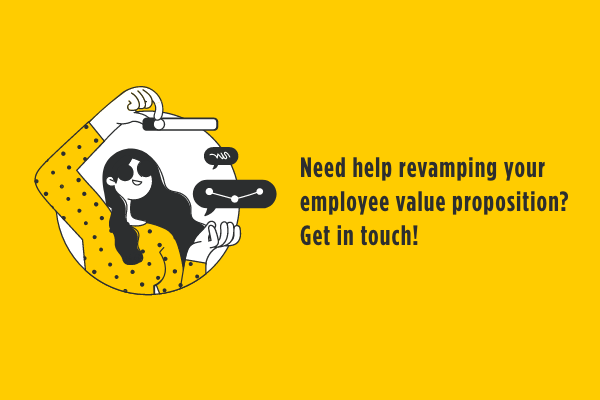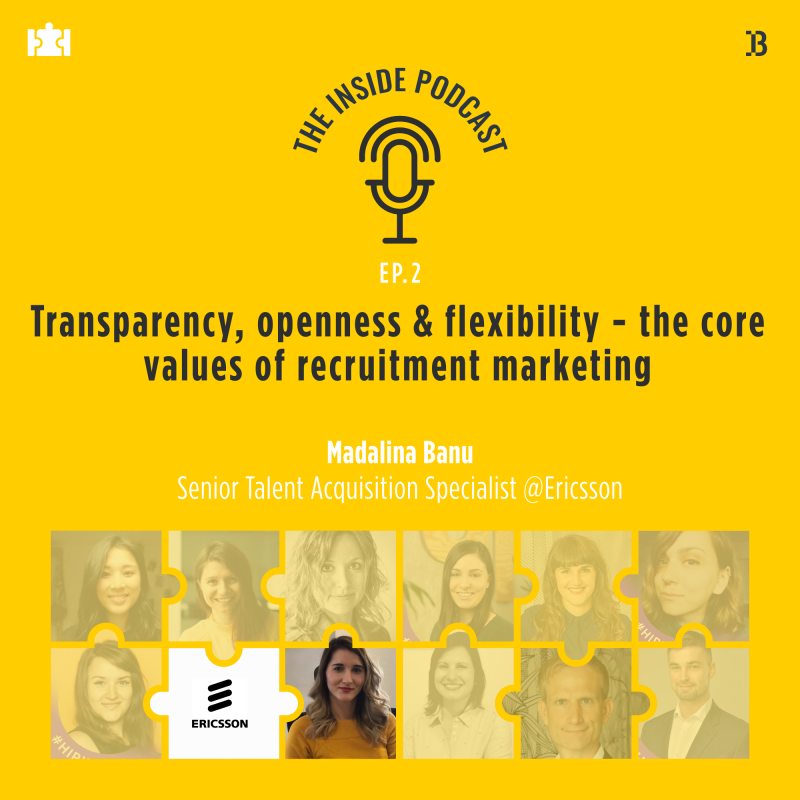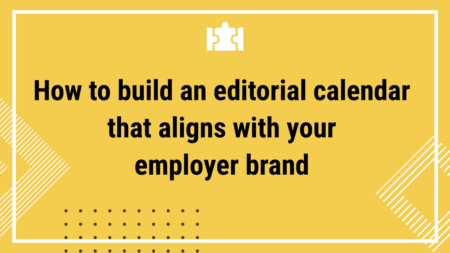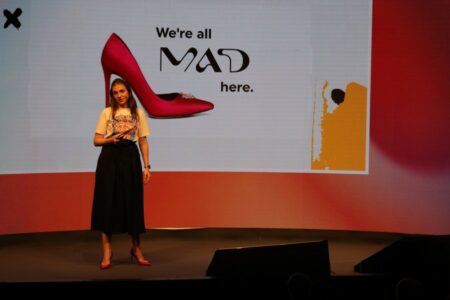Overview
In S02Ep.02 of Employer Branding: The Inside Podcast, we’ve had the pleasure of speaking with Madalina Banu, Senior Talent Acquisition Specialist, at Ericsson. We talked about recruitment marketing do’s and don’ts, and the impact candidates have on recruiters. In terms of key takeaways, once more we concluded that transparency and flexibility matter a lot when strengthening your employer brand.
What you’ll learn by listening
- Recruitment marketing do’s and don’ts: lessons to learn when starting out in recruitment
- Candidate impact & the influence they have on recruiters/hiring managers
- The importance of transparency when providing feedback to candidates
- Why it matters to be both active and proactive with your employer brand strategy
- Essential tips for people starting out in a Talent Acquisition role
About Ericsson
Ericsson helps customers enable the full value of connectivity by creating game-changing technology and services that are easy to use, adopt and scale. Their comprehensive portfolio ranges across Networks, Digital Services, Managed Services, and Emerging Businesses; powered by 5G and IoT platforms.
Enjoy listening to S02Ep.2 of Employer Branding: The Inside Podcast
Podcast transcription – What are the core values of recruitment marketing?
Georgiana: Hello everyone! We are today on the second episode in the second season of the Employer Branding: The Inside Podcast. And I’m talking to someone who’s working in recruitment marketing, in Romania. Her name is Madalina Banu. Welcome, Madalina, it’s no nice to meet you and have you here.
Madalina Banu: First of all, I would like to thank you, Georgiana, for giving me the opportunity to share my experience and learnings, based on the roles that I’ve had until now.
Georgiana: I’m really looking forward to approaching, again, a theme that has been going on and off in our podcasts; and that’s regarding talent acquisition. Madalina works as a Senior Talent Acquisition Specialist at Ericsson in Bucharest, Romania. I would like to ask you first Madalina, what does your role entail on a daily basis? I mean, we all know what talent acquisition means. But maybe you can tell us what this means for the company you work for.
Madalina Banu: The focus on my role is, of course, on the recruitment part. Needless to say, recruitment means more than just holding interviews; it also involves identifying business needs, hiring manager needs, candidate assessment, and ultimately, matching people with what the market and what candidates have to offer.
Georgiana: That’s really interesting, and a lot of feedback that I’ve gotten since I’ve started this podcast was from people who are just starting out, either as employer branding managers or as talent acquisition managers. A lot of people are always asking me for input with regards to what it’s like to start out, what it’s like to just begin a career in one of these areas? So this is my first concrete question in this podcast today is, if you’ve made mistakes in your role, what were they about? And could you have avoided them?
Madalina Banu: It’s a tough question, so allow me to do an introspection of my professional and personal life first because I would say they both go in parallel. The first mistake that comes to my mind is related to self-esteem. I didn’t think I was bold enough or savvy enough to perform my role, and that’s because I used to compare myself with the colleagues I saw as role models.
At the time, I had this list of criteria that I believed I had to check as a professional recruiter, and because of that, I was hesitant to stand up and embrace new challenges. Luckily, I had managers that saw my potential and pushed me to the limit. All those new experiences gave me confidence. I learned a lot from my mistakes, and at the same time, I felt supported and appreciated even when I believed I could have done better.

As for the second mistake, I often felt that I was losing focus in fulfilling the needs of all parties involved in the recruitment process. In my opinion, a successful recruitment process is when you manage to find the perfect match between what the candidate expects from his future career, team, manager, organizational environment and what the manager needs, on one side; and what I can actually meet from the objectives of the candidate and the hiring manager, on the other side.
My purpose is to make sure that I can correctly identify the motivation, the potential, how well the candidate will perform, how well and fast will he/she integrate in the team and to ensure a long-term collaboration. Due to different distractions in my activity (tight deadlines, workload, etc.), I used to focus more on the candidate and less on the needs of the hiring managers or vice versa. It happened that the candidate met all the role requirements but didn’t match with the team or company culture.
Last but not least, a third mistake that I made was rushing in. The need to hire as soon as possible led me to miss details, whether administrative or not.
Georgiana: Okay, but there must have been good parts about you starting out. So, if you want to think maybe of the most rewarding part, what would that be?
Madalina Banu: I will mention more than one aspect. The first is when a candidate becomes a colleague. The second is when I get to stay in touch with candidates that were not offered the position, and the third is when a hiring manager is satisfied with the consultancy I gave during the recruitment process.
On top of everything, one of the greatest parts about starting out was the opportunity to learn out more about the latest trends in the market. During tough times – the COVID pandemic – the most rewarding part is when I hire candidates who lost their jobs because of the impact of the pandemic.
Georgiana: In my doing this podcast, I’ve heard a lot of people speak about flexibility and openness, and transparency. So much so, that at some point I could think this is just regular textbook copy-paste. What is your take on this? While discussing with you before recording this podcast, you said you were many times surprised by some people, whose profile was maybe not so promising, but then proved to be otherwise. This also happened to me a few times. Could you give a specific example of such a situation where you kept an open mind, and then you were surprised by the candidate?
Madalina Banu: Well, it might seem that it’s just a copy/paste textbook, but if not applied, there could be negative consequences. Flexibility, in my opinion, is a must-have skill for a person, either as a candidate, an employee, or an employer.
The needs and the requests are dynamic, meaning that we need to act accordingly or at least try to adapt to change the things that we can change, and feel comfortable with our decisions and actions. In what concerns the openness and transparency that we expect from others (colleagues, managers, upper management), I believe that this is a fair expectation. If they’re not met, we lose faith, grit, and we feel like we’re not moving forward in meeting the same purpose.
I can relate to some examples from my experience. A positive example concerning transparency is when you provide full, transparent feedback to a candidate that wasn’t selected for a certain position. The candidate was open for feedback and this collaboration, and especially the feedback process, created a strong connection between us and we kept in touch for future roles.
For any role, we might encounter difficulties in being fully transparent, as there are some constraints that may not be in our control (e.g. budget, pandemic consequences, new business strategies). But it is in our control to embrace the changes and, again, to be flexible.
I can give a specific example in this regard. I was surprised to come across a candidate who applied for a very specific role. It required know-how in the accounting area. She worked for 15 years in tourism and, because of the pandemic, she lost her job. The information from her CV wasn’t relevant for the role we had available, but while taking a closer look at the studies section and while speaking with her during the phone interview, I found out that she used the time off to enroll in accounting courses. In addition, she studied a lot on her own. Her eagerness to reinvent herself, the will to start from 0, and especially to persevere in learning accounting, was a nice surprise.
Georgiana: Ok, and Madalina, just to shift a little bit our discussion. How important would you say is employer branding for a company, on a scale from 5 to 10? And why?
Madalina Banu: Candidates want to get to know the company, the people that work there, the organizational culture. This get-to-know process can take a while. Candidates pay attention to details, they source for information, so the company must be active and proactive with its employer brand strategy.
Online and offline, companies should engage every employee to promote and share their experience – starting from the candidate phase in the recruitment process all the way to the employee phase, and even when that candidate/employee transitions to another challenge; talk about the exit process and the overall experience overall.
Employer branding, as an awareness process, should be the first goal of a company that wants to stay competitive in the market. The second goal should be to attract candidates to fill in the openings.
Georgiana: I’m so glad that we stand united and on the same page, Madalina. Can you give me 3 tips for someone who’s starting out in recruitment marketing in a Talent Acquisition role?
Madalina Banu: That’s a very nice question. It has always been a pleasure to onboard new employees. An interview process brings along a lot of emotions: excitement, worries (of failure, of not being fit for the role, of being judged, of not being the best day for an interview). That being said, first of all, I would recommend creating a safe place for the candidate, so that he/she can feel comfortable while sharing their experience with you. Second, be supportive! The role of a recruiter is to offer advice, answer questions, and explain everything involved in the recruitment process. And third, don’t beat yourself down and enjoy every little or big accomplishment.
Georgiana: And now I would like to ask, do you have a favorite book that you could recommend?
Madalina Banu: Sure. I would recommend Hire with your Head, by Lou Adler. This was the first and most influential book that I read about hiring processes when I started.
Georgina: Okay, okay, good. It’s always useful for me to have books to add to my reading list. And going to the end of our podcast, because we are a bit short on time. I was wondering, you know, many articles nowadays mention new recruiting strategies for a post COVID world. Everywhere we read, everyone mentions the hybrid workplace, the new working conditions. Are we already talking about this? Are we already finding ourselves in this post COVID world? And if so, what are the recruiting strategies for this new period?
Madalina Banu: Indeed, it’s a hot subject that all HR people talk about. The health crisis changed our lives and our way of working completely. From a few days of working from home to a full remote schedule. The proven performance of employees that worked from anywhere during this period convinced companies that the office can be an option, not a must-have.
But if they do want to work from the office, the main purpose post-Covid is for employees to feel safe. Now they can book their seats, so we have full visibility in order to respect social distancing, cleaning facilities, wellbeing workshops, and preventive measures. But the strategy is continuously changing, as times are.
Georgiana: A Talent Management myth you can debunk?
Madalina Banu: I will debunk one that is closer to my heart, because I read so often about it, and specifically: that a recruiter deals only with interviews, meets new people, it’s a nice job talking to people all day.
The interview is just one of the steps of the recruitment process. First of all, there’s a business need to understand, to draw a recruitment marketing strategy, to gather people, engage them; there are negotiations processes, fast or under pressure decision making, managing diverse personalities, multiple roles to fill, adapt to people, market, new tools to use when sourcing, being involved in employer branding activities, create content, data to analyze, deadlines to meet, people relying on my work and how qualitative and fast I deliver results.
Georgiana: I absolutely agree, Madalina. Thank you so much for talking to me today. This was a real pleasure. I wish you the best of luck in your career and conducting your role. I hope to be in touch very soon.
For more podcasts and content on employer branding-related things, check us out on employerbranding.tech. You can also find our podcasts on Spotify and Apple Podcasts. Until the next time! Stay tuned! Bye!







